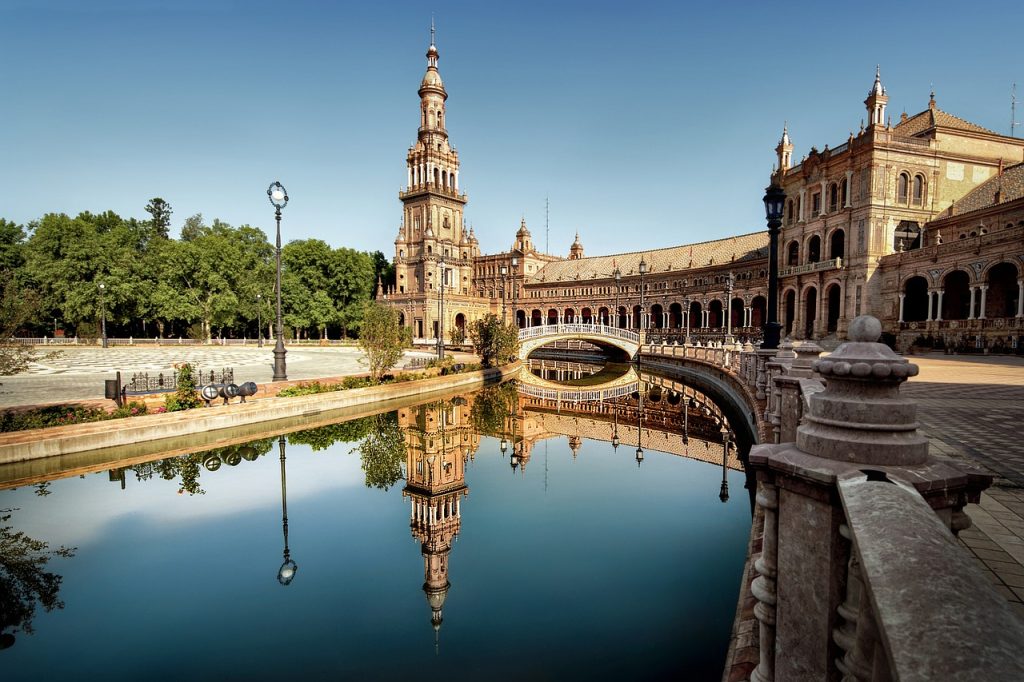Country Details
Spain, officially known as the Kingdom of Spain, is a diverse and vibrant country located in southwestern Europe. Here are five important facts about Spain:
- Rich History and Cultural Heritage: Spain has a rich historical and cultural background that spans over centuries. It was once a dominant global power during the 16th and 17th centuries, with extensive territories across Europe, the Americas, Africa, and Asia. This history has left a lasting impact on Spain's cultural heritage, evident in its architecture, art, literature, and traditions. The country is home to renowned historical sites like the Alhambra in Granada, the Sagrada Familia in Barcelona, and the Royal Palace in Madrid.
- Geographical Diversity: Spain is known for its diverse geography. It boasts a variety of landscapes, ranging from the stunning beaches along the Mediterranean and Atlantic coasts to the soaring mountains of the Pyrenees and Sierra Nevada. The country also includes the Balearic Islands in the Mediterranean and the Canary Islands off the northwest coast of Africa. This geographical diversity offers a wide range of outdoor activities, such as hiking, skiing, and water sports.
- Flamenco and Bullfighting: Spain is famous for its traditional arts, particularly flamenco music and dance. Flamenco is a passionate and expressive art form that originated in the Andalusian region of Spain and is characterized by its rhythmic guitar playing, hand clapping, singing, and intricate dance moves. Bullfighting, although controversial, is another cultural tradition deeply rooted in Spanish history. It is considered a spectacle of art and bravery, attracting both fans and critics.
- Soccer and Sports: Spain is a major player in the world of soccer, with a long-standing passion for the sport. Spanish clubs, such as Real Madrid and Barcelona, have enjoyed success on both domestic and international levels, and the national team has won numerous championships, including the FIFA World Cup in 2010 and the UEFA European Championship in 1964, 2008, and 2012. Besides soccer, Spain also excels in other sports like basketball, tennis, motorsports, and cycling.
- Culinary Delights: Spanish cuisine is renowned worldwide for its flavors and diversity. Each region of Spain has its own unique culinary traditions and specialties. From the world-famous paella from Valencia to tapas, a wide variety of small dishes served as appetizers, Spain offers a gastronomic experience that delights the taste buds. Other iconic dishes include gazpacho, tortilla española (Spanish omelet), jamón ibérico (Iberian ham), and a vast selection of seafood.
Immigration Details
Immigrating to Spain
can be achieved through various pathways, including the Golden Visa program, establishing a company, investment, real estate, work permits, and study. Let's explore each option along with the estimated timeframes, fees, and supporting documents required:
1. Golden Visa:
The Golden Visa program allows non-European Union (EU) citizens to obtain residency in Spain by making a qualifying investment. Currently, the minimum investment threshold is €500,000. The investment can be made in real estate, government bonds, or capital in Spanish companies. The estimated timeframe to obtain residency is around 20-30 days after the investment is made.
Supporting Documents:
- Valid passport
- Proof of investment and its legality
- Proof of sufficient funds to support yourself and any dependents
- Medical insurance coverage
Estimated Fees: In addition to the investment amount, there are other fees involved, such as legal fees, administrative costs, and application fees. These can vary depending on the specific circumstances and legal assistance required.
2. Establishing a Company:
Starting a business in Spain can also provide a pathway to residency. The capital requirements vary depending on the legal form of the company. For example, a Sociedad Limitada (SL) requires a minimum share capital of €3,000, while a Sociedad Anónima (SA) requires a minimum share capital of €60,000. It's important to note that these capital requirements may change, and legal advice should be sought.
Supporting Documents:
- Business plan
- Proof of sufficient funds to establish and operate the company
- Documentation related to the business, such as registration, licenses, and permits
- Valid passport
- Proof of health insurance coverage
Estimated Timeframe: Establishing a company can take several weeks to complete the necessary procedures and obtain the required permits and licenses.
3. Investment and Real Estate:
Investing in Spain, particularly in real estate, can also lead to residency. The minimum investment threshold for this route is €500,000. The estimated timeframe to obtain residency is similar to that of the Golden Visa program, around 20-30 days.
Supporting Documents:
- Proof of investment, such as property deeds or other investment documentation
- Valid passport
- Proof of sufficient funds to support yourself and any dependents
- Medical insurance coverage
Estimated Fees: Apart from the investment amount, additional costs may include taxes, notary fees, and legal fees associated with the property purchase or investment.
4. Work Permit:
Obtaining a regular work permit in Spain can become a quite complex task, and that is why we always suggest to aim for any of its alternatives. Depending on your situation, professional profile and the job offer you have, there are different types of work visas you can apply for. Each has its own requirements and the application differs:
- The regular work permit must be applied for from your country of origin. Just a few job positions will be valid for this type of work permit (those under the shortage occupation list), which makes it really completed to be obtained. Your employer from Spain will be the one to request the residence permit for you, while you are in your country of origin (as it CANNOT be applied directly from Spain).
- If you have a job offer as a highly qualified worker, the procedure to get the residence permit can start while in Spain. This visa is granted to those who get an offer as managers or any other technical position, and who earn over 50.000€ per year.
- The Intra-Corporate Transfer Visa applies to multinational company employees who need to relocate to the Spanish headquarters to continue working or to take any type of training.
- Similar to the skilled professional visa you also have the EU blue card, which allows you to work in the whole European Union area.
Supporting Documents:
- Job offer letter
- Employment contract
- Valid passport
- Proof of qualifications and work experience
- Proof of sufficient funds to support yourself and any dependents
- Medical insurance coverage
Estimated Fees: The fees for work permits vary depending on the type of permit and the processing times. It's advisable to consult with the relevant authorities or an immigration lawyer to get accurate information.
5. Student Visa
Do you want to do your masters or Ph.D. in Spain? Start a Spanish course or complete your professional training for a specific sector? Then the student visa is for you. This residence permit allows non-EU citizens to study in Spain. After the immigration updates from 2022, you can even work up to 30 hours per week on a student visa, and to internship.
Its application process is also beneficial, as you can apply directly from Spain as a tourist within the first 60 days of your stay.
Besides, the student residence permit becomes many times the perfect gateway to enter Spain and stay for the long-run. That is because after completing your studies you can easily transition into a work permit, eliminating the complex work visa requirements.
If you are unable to find a job during your studies you can apply for the residency called “búsqueda de empleo”. This job search permit allows foreign students in Spain to extend their stay for up to two years to look for a job or start their own company. The student must have finished their studies at the time of application, and can apply for this permit 60 days before their student authorization expires or 90 days after.
Supporting Documents:
- Acceptance letter from an educational institution
- Proof of sufficient funds to cover expenses
- Valid passport
- Medical insurance coverage
Estimated Fees: Fees for studying in Spain include tuition fees, living expenses, and administrative fees charged by the educational institution.
6. Spain Digital Nomad Visa
If you plan to work remotely from Spain for a foreign company, or as a freelancer with clients outside Spain (as long as your total turnover coming directly for Spain does not exceed 20%), you can get the digital nomad visa.
This is a great option, as you can apply for it both from your country of origin and from Spain. Plus, thanks to being the holder of this residency, you will pay fewer taxes, (just a flat 24% on your income), as you will be able to benefit from the Beckham Law.
But this permit has many other advantages, like the ability to include your family members in the application, the possibility of receiving a resolution in less than 20 days (fast-track application), or the fact that it is a residence for 3 years (renewable for 2 until you obtain permanent residency).
When it comes to the main requirements, there needs to have already been an existing contract with the foreign company/client three months prior to the application, and this company must have already been operating for at least 1 year. For personal requirements, the individual must demonstrate sufficient economic funds through either an employment contract, or a bank certificate proving the possession of at least €25,920 for the main applicant, which is 200% of the minimum wage in Spain. They must also prove that they have 3-years worth of work-related experience, or graduated from a reputable academic institution.
7. Spain Non-Lucrative Visa
Let’s say that you do not want to work in Spain. You would like to retire in the country, or you want to travel around Spain and Europe for a year, or you would like to immerse yourself in a new culture without embarking on any economic activity. Then, the retirement or non-lucrative visa will be the best option for you. Its requirements are really straightforward:
- You need private health insurance.
- It is also required to demonstrate the possession of sufficient economic funds. The legal requirement is 28.800€ but depending on your consulate that amount can increase (and you can even see that a rental contract is required).
There are two options to obtain this permit: apply from your country of origin, or directly from Spain but just if you are moving from another residency or from a student visa (as you can’t get an NLV as a tourist).
This is for sure one of the most sought permits in Spain, and at our offices we weekly receive clients from all countries who wish to obtain their non-lucrative visa as it offers a straightforward application and great advantages.



Add a review